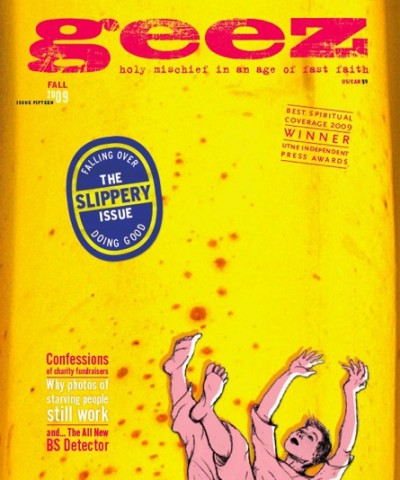Posing as progressive: The problem with PC
I support the use of respectful language for marginalized and stigmatized people. I also think it important to consider the shadow side to political correctness.
Point 1: It fears weakness
Consider the word “retarded.” Though the term is not technically incorrect – it is still found in some medical dictionaries – it is deemed problematic. But maybe the real problem is not with the term but the fact that we have heaped onto it all our pro-smart bias and our great awkwardness with people who are obviously not smart. Maybe the problem is that we live in a society in which smart equals good. Maybe the problem is that it’s hard for us, despite our presumably enlightened state, not to see people who are “slow or limited in … intellectual development” (the Webster definition for retarded) as inferior. Maybe if we truly felt it was okay to be retarded, then the word would be okay, too.
We can keep changing the word in hopes of staying ahead of the negative connotation that is sure to follow, or perhaps we could confess that we fear weakness and disability, and we desperately want our friends and families to be “normal.”
And I wonder how a developmentally delayed person feels at the moment she realizes the word she has used to identify herself is now an insult. What happens when your identity becomes pejorative?
This critique does not apply to all PC usage, but I think it is worth asking to what extent correctness is a sophisticated way to mask and avoid deep fears, and perhaps guilt, around weakness, disparity, difference and “abnormality.”
Point 2: It’s morally queasy
I worry that political correctness prevents us from talking about some awkward, though necessary, topics. In the progressive PC script, marginalized people (and their PC allies) are noble protagonists fighting injustice. But this oversimplifies the fact that we are all a mix of nobility and its opposite. So when Australian aid worker Phil Sparrow portrays both the Afghan recipients of aid and the foreign aid workers as schmucks (see page 32), it seems incorrect. But who do we help by glossing over the gritty reality? We need a space in which to discuss things like a culture of dependency among aid recipients, or the embrace of McWal-Mart-style consumerism among many indigenous people, or our own mixed motives and messy methods. I find people in PC land inordinately reluctant to discuss such things.
Point 3: It’s too easy
If I were to use blatantly racist language in a Geez article, my inbox would probably fill with protest from progressives. But if I use blatantly racist electricity – that is, electricity from hydroelectric dams that harm indigenous people – to power my computer, I can pretty much be assured the progressiveness police will not pay heed. The social sanction against racist language is much harsher than that for racist consumption. (And I would argue that much of our consumption involves exploitation of minority ethnic groups.)
I see a tendency within the progressive-minded subculture to scrutinize only a very particular set of behaviours. These tend to be the behaviours, such as language, that are easiest to change without infringing on our most cherished entitlements – primarily the entitlement to our comfy, middle-class lives. For instance, it’s easier to use the most up-todate term for indigenous people groups than to deal with the fact that most of us non-indigenous North Americans live on ill-gotten land. It’s easier to speak properly of people living with mental illness than to befriend and accompany people who talk to themselves in public (and if you find that linkage “incorrect,” reread Point 1).
The same principle applies to other easy progressive behaviours. It’s easier to switch to fair trade coffee than to give up addiction to foods from an ocean away. It’s easier to become pro-queer than to become poor, that is, to quit the over-consumptive middle class. In short, the code of progressive behaviour tends to dodge the tough stuff.
It is, of course, possible to do both the easy and tough stuff. But I worry that PC can be to equality what recycling is to environmentalism – it makes us feel like we’ve done our part even though we never get near the crux of the matter. I worry that too often it’s about us trying to make ourselves appear and feel sophisticated within our subculture, thereby creating a veneer of enlightenment that masks real issues.
But that all sounds harsher and more categorical than I mean it to. I get too impatient with process when big tasks await. Ample room must be left for exceptions, counter-arguments and, most of all, the grace we need to face a terribly incorrect world.
Will Braun is editor of Geez. He is white, male, educated, relatively slim, hetero, healthy and more middle class than he’d like to admit.



Sorry, comments are closed.